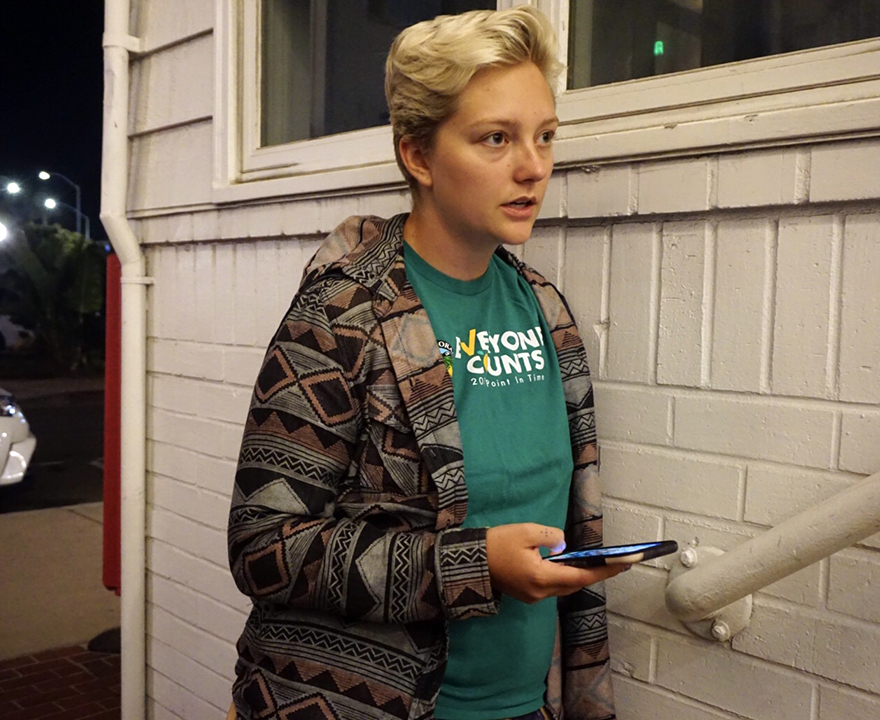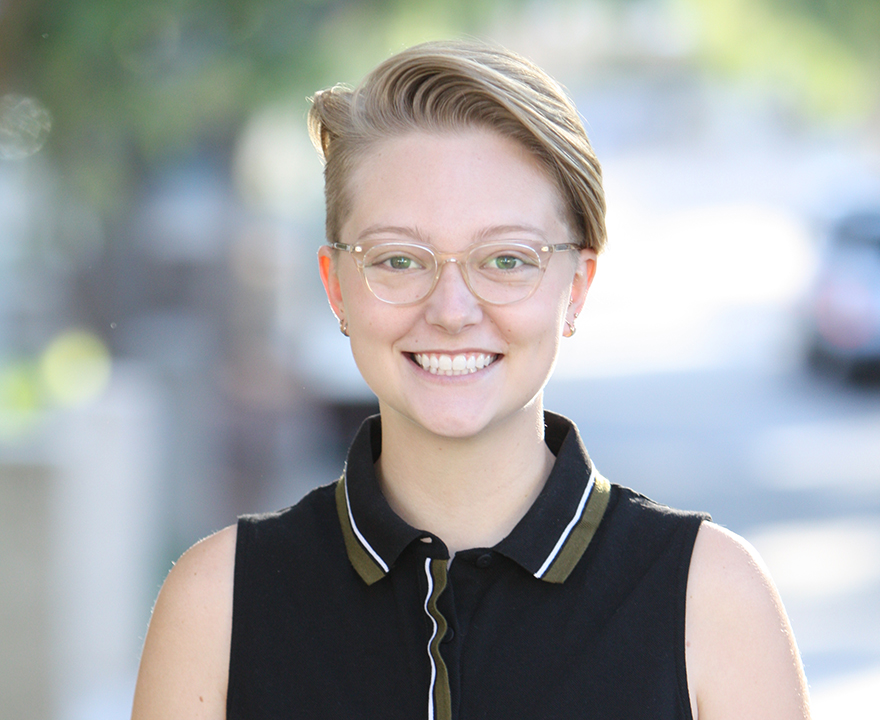Spurred by personal experience, UCI graduate student researches gender and homelessness

Spurred by personal experience, UCI graduate student researches gender and homelessness
- August 27, 2019
- Payton Huse, sociology, wins competitive National Science Foundation research fellowship
-----
 Payton Huse moved from the Midwest to California planning to help elementary school
students in immigrant communities succeed. What she got was an up-close look at California’s
affordable housing crisis, and her own experience with unstable housing.
Payton Huse moved from the Midwest to California planning to help elementary school
students in immigrant communities succeed. What she got was an up-close look at California’s
affordable housing crisis, and her own experience with unstable housing.
“No one is safe when they are homeless, but women are especially vulnerable,” says Huse, a first-generation graduate student in UCI’s sociology Ph.D. program. Her experience shifted her interest from immigration to research on homelessness and, in particular, the ways that gender plays into the homeless experience. And the National Science Foundation is now supporting her work with a competitive Graduate Research Fellowship Program award.
An eye-opening experience
Huse joined AmeriCorps after finishing her bachelor’s degree at the University of Missouri and moved to San Jose to run after school programs at public schools. Living in a flea-ridden apartment with a half dozen other young women and two cats for most of the year, the situation eventually became untenable and she had to leave. But with the small stipend for what was technically considered a volunteer position with AmeriCorps, she couldn’t afford rent elsewhere. A program counselor found Huse a spot at a shelter, but instead Huse accepted offers from coworkers and friends to stay with them for the rest of her time with the program. She wasn’t on the streets, but she had nowhere to call home.
While her own housing situation was unstable, Huse also developed relationships with unhoused women in San Jose. In a neighborhood with a large number of homeless women, Huse did custodial services at a yoga studio in exchange for classes. It was there that she became aware of the unique issues homeless women in the area were experiencing. At the yoga studio, she participated in dinners hosted for the neighborhood’s homeless women, as well as donation drives to provide feminine hygiene products — a program she also brought to the elementary school where she worked.
Turning experience into action, research
As a first-gen college student, Huse relied heavily on her undergraduate faculty mentors for academic guidance. She became interested in graduate school when a former professor shared her experiences earning her doctorate at UCI, and it sounded appealing. Huse originally planned to study immigration, but her personal experience caused her to pivot.
“UCI is an ideal location to study homelessness,” Huse says, noting that sociology faculty David Snow and Rachel Goldberg are leading much of Orange County’s research on the issue. Today, 6,860 people live in Orange County without housing, according to the most recent count by United to End Homelessness. What’s more, the county is embroiled in heated political debates about how to address homeless encampments along the Santa Ana riverbed just 15 miles from campus.
Women are often the invisible homeless, Huse points out, because they tend to be housed in shelters at higher rates than men, so they are less likely to be seen in public, sleeping on benches or sidewalks. Research practices have reflected that, with most of the literature about homelessness focused on men and those who live on the streets, she says.
“Payton is interested in understanding inequalities from many levels, and this sense of curiosity about the social world makes her well-positioned to tackle pressing real-world problems,” says Kristin Turney, associate professor of sociology, who serves as a faculty mentor to Huse.
This year, Huse earned the National Science Foundation (NSF) Graduate Research Fellowship, which provides funding for outstanding graduate students in NSF-supported science, technology, engineering, and mathematics disciplines. The financial support will enable her to spend more time focused on her research and travel to academic conferences to present her work.
Across the country, only 24 graduate students in sociology received the honor in 2019, so winning the prestigious award speaks to Huse’s promising academic future.
With the funding, Huse is further examining how women access reproductive health care when they lack secure housing, and in general how women experience homelessness differently than men. Since starting her research projects with shelters in Orange County, she has also become curious about how shelters construct gender roles.
“It seems like there’s an ideal femininity that’s supposed to be enacted in the shelters,” Huse says, pointing out healthy cooking classes are sometimes offered to women who don’t have a home, much less a kitchen. “Are they helping them be good women, or helping them get housing?”
Ahead of the game
Huse got a jumpstart on her graduate research by participating in UCI’s Competitive Edge Summer Research Program, which brings graduate students from diverse backgrounds to campus the summer before their graduate program officially starts in the fall. Over the summer, the participants begin conducting research, attend workshops and participate in reading groups. The program also pairs students with a faculty mentor and a peer mentor — which is how Huse got involved with Turney’s research.
“Getting here three months early gave me extra time to adjust to graduate school and learn about the campus,” says Huse.
Huse has not been disappointed. “The best thing at UCI has been the faculty advisors and mentors that I’ve had — especially the women,” says Huse. “I can see myself in them and see myself trying to do the job that they’re doing. I see them doing cool work and enjoying their job.” Although Huse would like to become a professor, she doesn’t rule out working for a government agency or research institution after earning her doctorate.
For the rest of her time at UCI, Huse will be buoyed by her fellowship, but she won’t soon forget her personal experiences with housing insecurity.
“I have this really rare and special funding opportunity,” she says. “I want to continue to work to make sure that funding is secure and livable for others.”
-Christine Byrd for UCI School of Social Sciences
Pictured: Payton Huse assisted with Orange County’s 2019 point in time count of people experiencing homelessness.
Follow Payton on: Twitter @paytonhuse | Instagram @paytonhuse | Facebook https://www.facebook.com/payton.huse
-----
Would you like to get more involved with the social sciences? Email us at communications@socsci.uci.edu to connect.
Share on:
Related News Items
- Careet RightUCI sociologists earn American Sociological Association honors, leadership roles
- Careet RightMultiple honors for UCI soc sci's Maricela Bañuelos
- Careet RightAttending the National Conference for Black Political Scientists
- Careet RightA lesson in solidarity
- Careet RightUCI sociologists are making their mark


